Work Environment: Analyzing NHS Structures, Policies & Social Identity
VerifiedAdded on 2023/06/12
|11
|3173
|208
Report
AI Summary
This report provides a comprehensive analysis of the National Health Service (NHS) in the UK, focusing on its organizational structure, goals, and purposes, including improving healthcare quality and providing safe services. It explores the functional structure of the NHS, stakeholder engagement, and relevant organizational theories such as classical, neoclassical, and modern theories. The report also examines the six core values and ethical practices within the NHS, including beneficence, nonmaleficence, autonomy, informed consent, and truth-telling, alongside CSR activities. Furthermore, it discusses key policies and legislations like the Health and Social Care Act 2012 and the Equality Act 2010, and analyzes two forms of social identity within the NHS, highlighting the organization's commitment to equality and non-discrimination. Desklib offers more solved assignments for students.
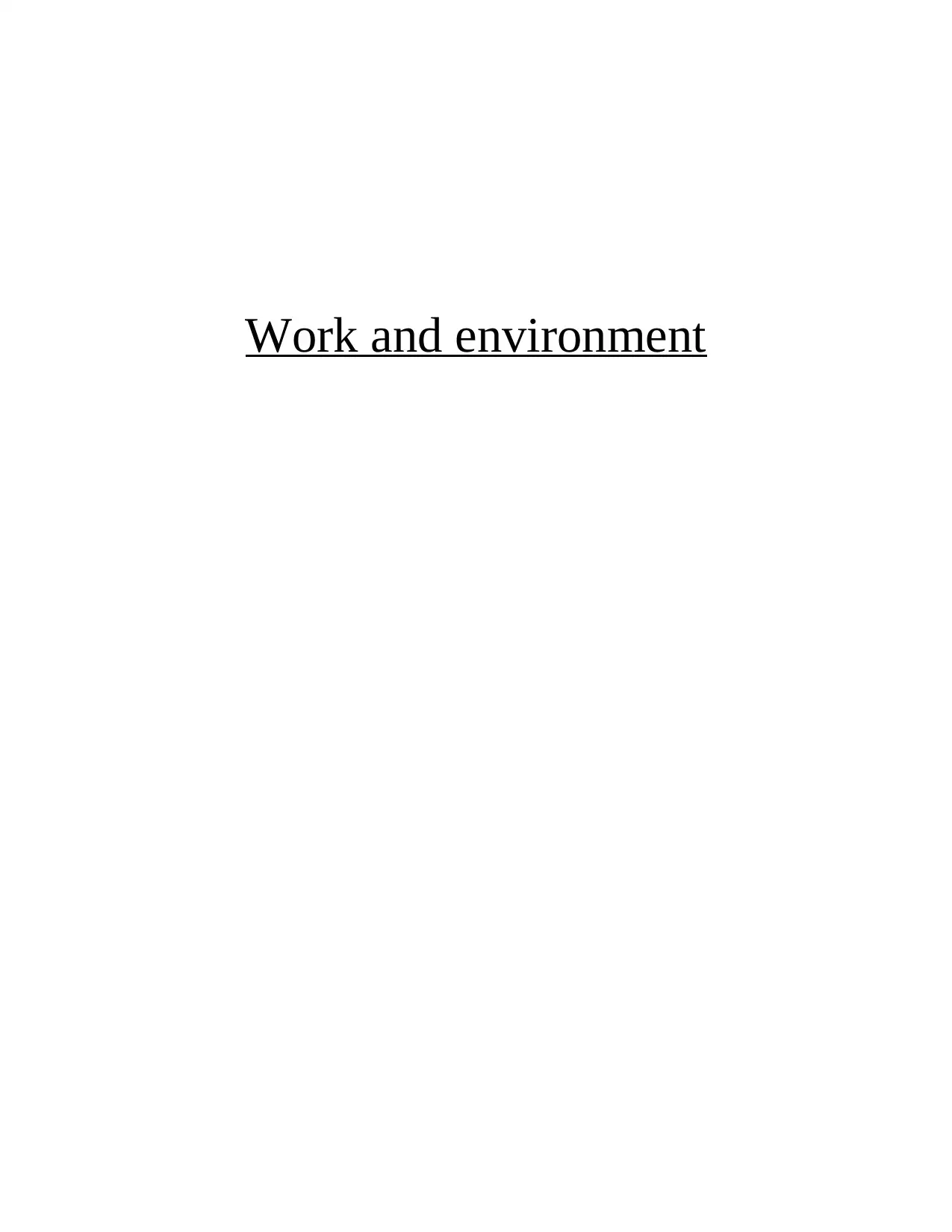
Work and environment
Paraphrase This Document
Need a fresh take? Get an instant paraphrase of this document with our AI Paraphraser
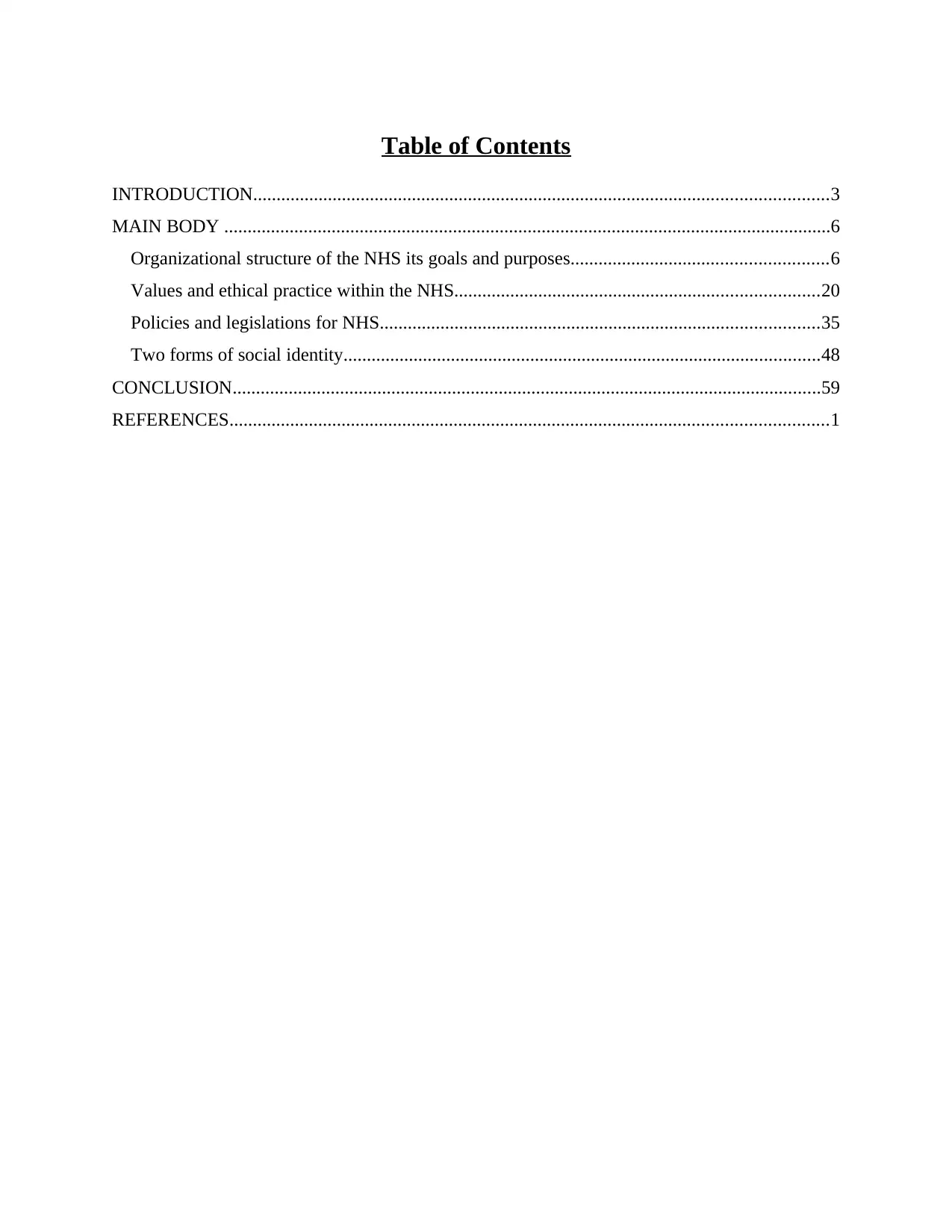
Table of Contents
INTRODUCTION...........................................................................................................................3
MAIN BODY ..................................................................................................................................6
Organizational structure of the NHS its goals and purposes.......................................................6
Values and ethical practice within the NHS..............................................................................20
Policies and legislations for NHS..............................................................................................35
Two forms of social identity......................................................................................................48
CONCLUSION..............................................................................................................................59
REFERENCES................................................................................................................................1
INTRODUCTION...........................................................................................................................3
MAIN BODY ..................................................................................................................................6
Organizational structure of the NHS its goals and purposes.......................................................6
Values and ethical practice within the NHS..............................................................................20
Policies and legislations for NHS..............................................................................................35
Two forms of social identity......................................................................................................48
CONCLUSION..............................................................................................................................59
REFERENCES................................................................................................................................1
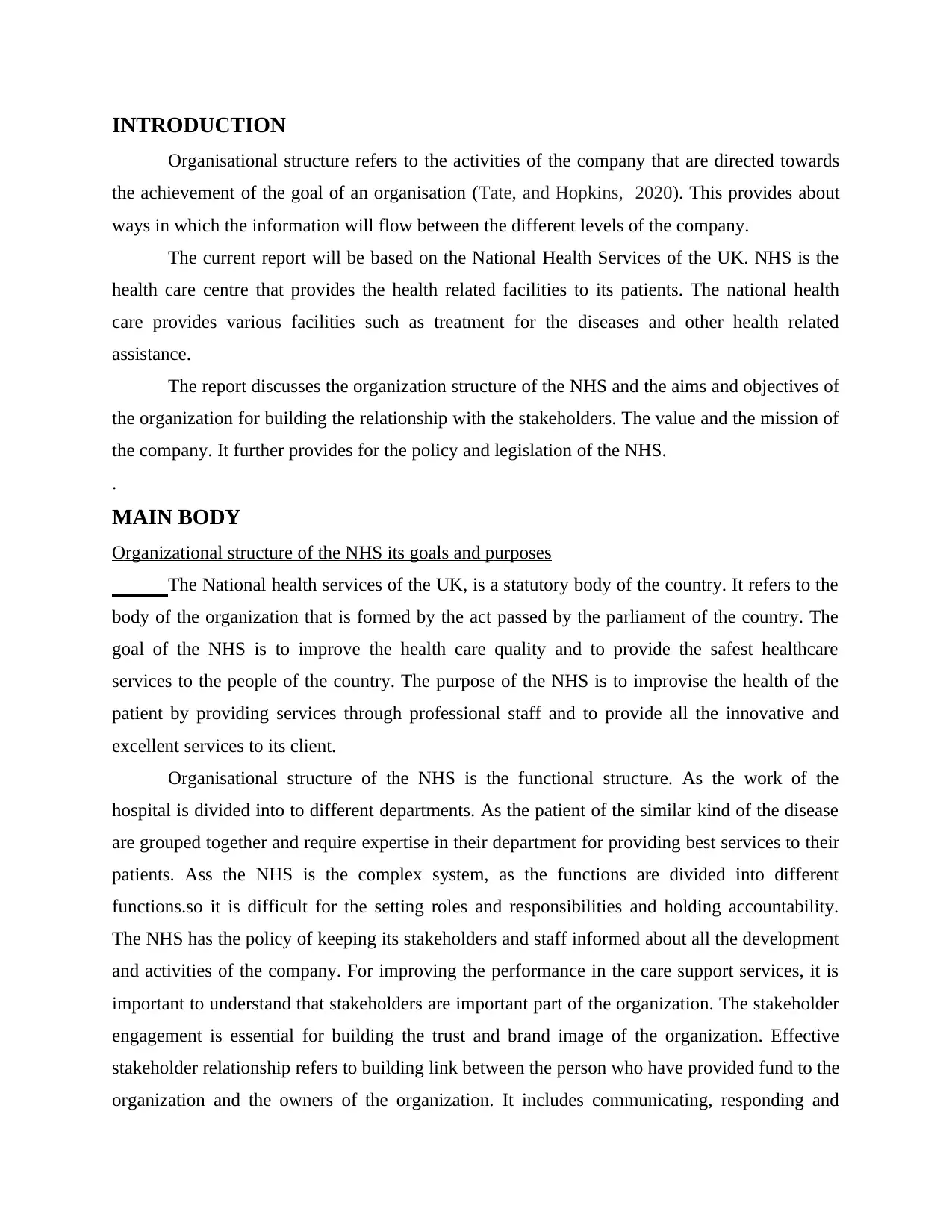
INTRODUCTION
Organisational structure refers to the activities of the company that are directed towards
the achievement of the goal of an organisation (Tate, and Hopkins, 2020). This provides about
ways in which the information will flow between the different levels of the company.
The current report will be based on the National Health Services of the UK. NHS is the
health care centre that provides the health related facilities to its patients. The national health
care provides various facilities such as treatment for the diseases and other health related
assistance.
The report discusses the organization structure of the NHS and the aims and objectives of
the organization for building the relationship with the stakeholders. The value and the mission of
the company. It further provides for the policy and legislation of the NHS.
.
MAIN BODY
Organizational structure of the NHS its goals and purposes
The National health services of the UK, is a statutory body of the country. It refers to the
body of the organization that is formed by the act passed by the parliament of the country. The
goal of the NHS is to improve the health care quality and to provide the safest healthcare
services to the people of the country. The purpose of the NHS is to improvise the health of the
patient by providing services through professional staff and to provide all the innovative and
excellent services to its client.
Organisational structure of the NHS is the functional structure. As the work of the
hospital is divided into to different departments. As the patient of the similar kind of the disease
are grouped together and require expertise in their department for providing best services to their
patients. Ass the NHS is the complex system, as the functions are divided into different
functions.so it is difficult for the setting roles and responsibilities and holding accountability.
The NHS has the policy of keeping its stakeholders and staff informed about all the development
and activities of the company. For improving the performance in the care support services, it is
important to understand that stakeholders are important part of the organization. The stakeholder
engagement is essential for building the trust and brand image of the organization. Effective
stakeholder relationship refers to building link between the person who have provided fund to the
organization and the owners of the organization. It includes communicating, responding and
Organisational structure refers to the activities of the company that are directed towards
the achievement of the goal of an organisation (Tate, and Hopkins, 2020). This provides about
ways in which the information will flow between the different levels of the company.
The current report will be based on the National Health Services of the UK. NHS is the
health care centre that provides the health related facilities to its patients. The national health
care provides various facilities such as treatment for the diseases and other health related
assistance.
The report discusses the organization structure of the NHS and the aims and objectives of
the organization for building the relationship with the stakeholders. The value and the mission of
the company. It further provides for the policy and legislation of the NHS.
.
MAIN BODY
Organizational structure of the NHS its goals and purposes
The National health services of the UK, is a statutory body of the country. It refers to the
body of the organization that is formed by the act passed by the parliament of the country. The
goal of the NHS is to improve the health care quality and to provide the safest healthcare
services to the people of the country. The purpose of the NHS is to improvise the health of the
patient by providing services through professional staff and to provide all the innovative and
excellent services to its client.
Organisational structure of the NHS is the functional structure. As the work of the
hospital is divided into to different departments. As the patient of the similar kind of the disease
are grouped together and require expertise in their department for providing best services to their
patients. Ass the NHS is the complex system, as the functions are divided into different
functions.so it is difficult for the setting roles and responsibilities and holding accountability.
The NHS has the policy of keeping its stakeholders and staff informed about all the development
and activities of the company. For improving the performance in the care support services, it is
important to understand that stakeholders are important part of the organization. The stakeholder
engagement is essential for building the trust and brand image of the organization. Effective
stakeholder relationship refers to building link between the person who have provided fund to the
organization and the owners of the organization. It includes communicating, responding and
⊘ This is a preview!⊘
Do you want full access?
Subscribe today to unlock all pages.

Trusted by 1+ million students worldwide
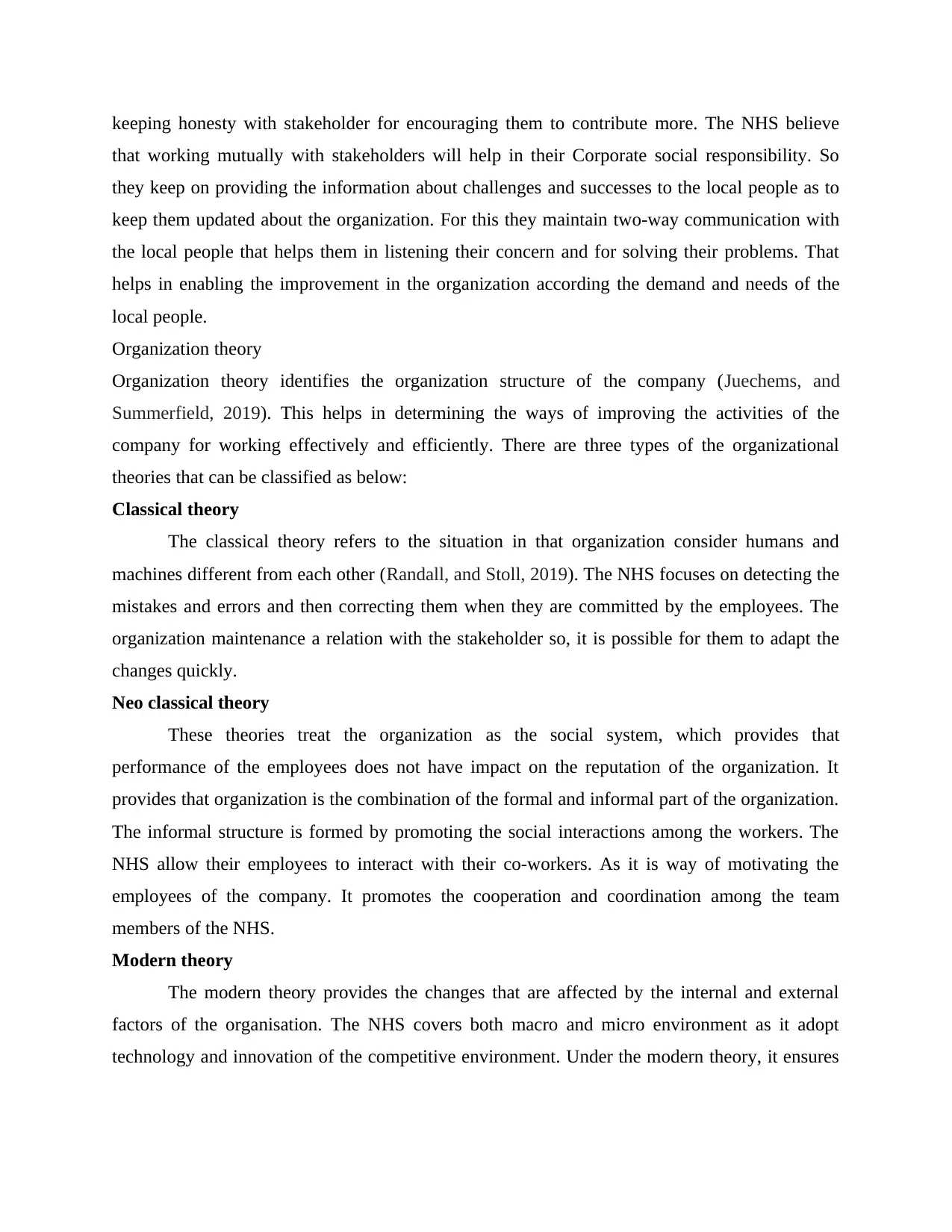
keeping honesty with stakeholder for encouraging them to contribute more. The NHS believe
that working mutually with stakeholders will help in their Corporate social responsibility. So
they keep on providing the information about challenges and successes to the local people as to
keep them updated about the organization. For this they maintain two-way communication with
the local people that helps them in listening their concern and for solving their problems. That
helps in enabling the improvement in the organization according the demand and needs of the
local people.
Organization theory
Organization theory identifies the organization structure of the company (Juechems, and
Summerfield, 2019). This helps in determining the ways of improving the activities of the
company for working effectively and efficiently. There are three types of the organizational
theories that can be classified as below:
Classical theory
The classical theory refers to the situation in that organization consider humans and
machines different from each other (Randall, and Stoll, 2019). The NHS focuses on detecting the
mistakes and errors and then correcting them when they are committed by the employees. The
organization maintenance a relation with the stakeholder so, it is possible for them to adapt the
changes quickly.
Neo classical theory
These theories treat the organization as the social system, which provides that
performance of the employees does not have impact on the reputation of the organization. It
provides that organization is the combination of the formal and informal part of the organization.
The informal structure is formed by promoting the social interactions among the workers. The
NHS allow their employees to interact with their co-workers. As it is way of motivating the
employees of the company. It promotes the cooperation and coordination among the team
members of the NHS.
Modern theory
The modern theory provides the changes that are affected by the internal and external
factors of the organisation. The NHS covers both macro and micro environment as it adopt
technology and innovation of the competitive environment. Under the modern theory, it ensures
that working mutually with stakeholders will help in their Corporate social responsibility. So
they keep on providing the information about challenges and successes to the local people as to
keep them updated about the organization. For this they maintain two-way communication with
the local people that helps them in listening their concern and for solving their problems. That
helps in enabling the improvement in the organization according the demand and needs of the
local people.
Organization theory
Organization theory identifies the organization structure of the company (Juechems, and
Summerfield, 2019). This helps in determining the ways of improving the activities of the
company for working effectively and efficiently. There are three types of the organizational
theories that can be classified as below:
Classical theory
The classical theory refers to the situation in that organization consider humans and
machines different from each other (Randall, and Stoll, 2019). The NHS focuses on detecting the
mistakes and errors and then correcting them when they are committed by the employees. The
organization maintenance a relation with the stakeholder so, it is possible for them to adapt the
changes quickly.
Neo classical theory
These theories treat the organization as the social system, which provides that
performance of the employees does not have impact on the reputation of the organization. It
provides that organization is the combination of the formal and informal part of the organization.
The informal structure is formed by promoting the social interactions among the workers. The
NHS allow their employees to interact with their co-workers. As it is way of motivating the
employees of the company. It promotes the cooperation and coordination among the team
members of the NHS.
Modern theory
The modern theory provides the changes that are affected by the internal and external
factors of the organisation. The NHS covers both macro and micro environment as it adopt
technology and innovation of the competitive environment. Under the modern theory, it ensures
Paraphrase This Document
Need a fresh take? Get an instant paraphrase of this document with our AI Paraphraser
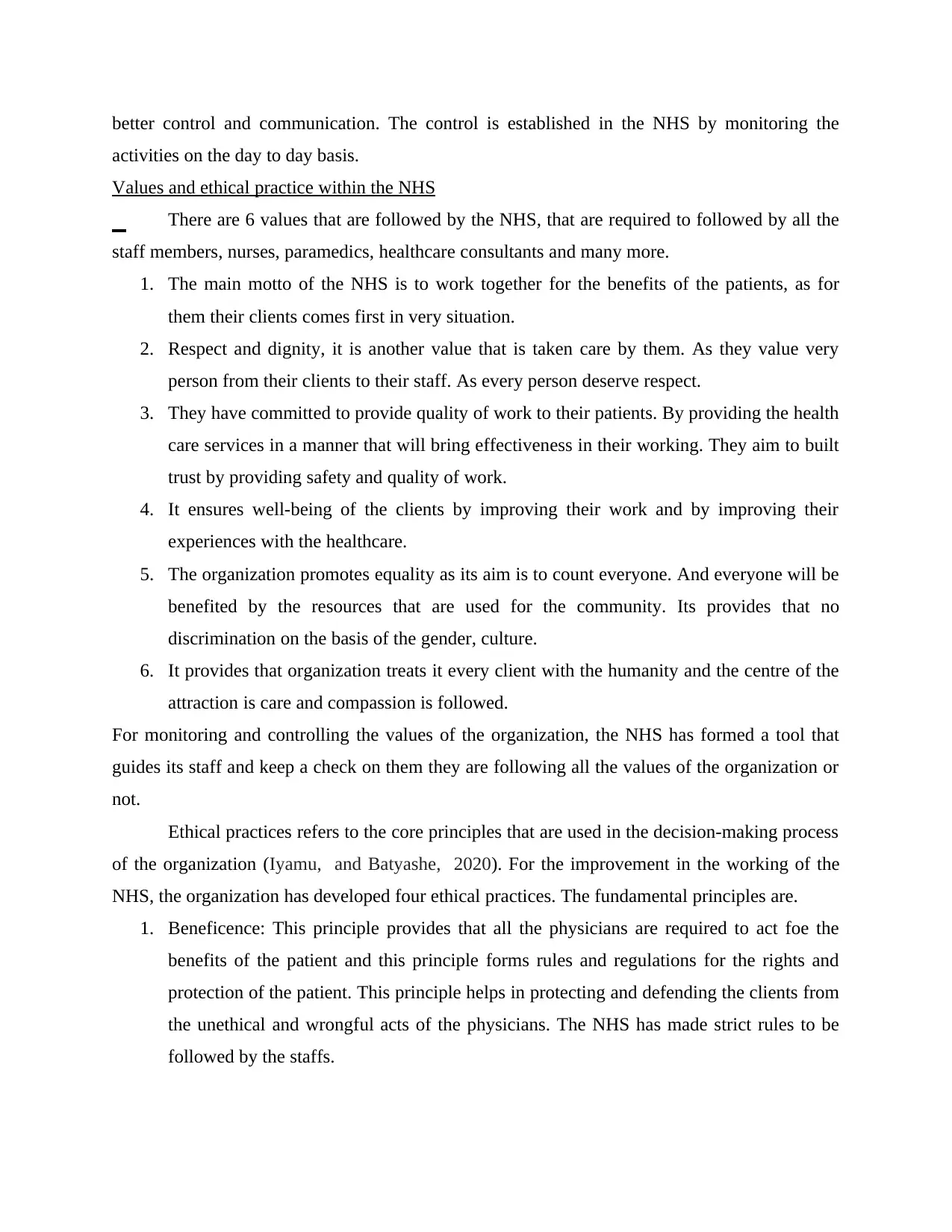
better control and communication. The control is established in the NHS by monitoring the
activities on the day to day basis.
Values and ethical practice within the NHS
There are 6 values that are followed by the NHS, that are required to followed by all the
staff members, nurses, paramedics, healthcare consultants and many more.
1. The main motto of the NHS is to work together for the benefits of the patients, as for
them their clients comes first in very situation.
2. Respect and dignity, it is another value that is taken care by them. As they value very
person from their clients to their staff. As every person deserve respect.
3. They have committed to provide quality of work to their patients. By providing the health
care services in a manner that will bring effectiveness in their working. They aim to built
trust by providing safety and quality of work.
4. It ensures well-being of the clients by improving their work and by improving their
experiences with the healthcare.
5. The organization promotes equality as its aim is to count everyone. And everyone will be
benefited by the resources that are used for the community. Its provides that no
discrimination on the basis of the gender, culture.
6. It provides that organization treats it every client with the humanity and the centre of the
attraction is care and compassion is followed.
For monitoring and controlling the values of the organization, the NHS has formed a tool that
guides its staff and keep a check on them they are following all the values of the organization or
not.
Ethical practices refers to the core principles that are used in the decision-making process
of the organization (Iyamu, and Batyashe, 2020). For the improvement in the working of the
NHS, the organization has developed four ethical practices. The fundamental principles are.
1. Beneficence: This principle provides that all the physicians are required to act foe the
benefits of the patient and this principle forms rules and regulations for the rights and
protection of the patient. This principle helps in protecting and defending the clients from
the unethical and wrongful acts of the physicians. The NHS has made strict rules to be
followed by the staffs.
activities on the day to day basis.
Values and ethical practice within the NHS
There are 6 values that are followed by the NHS, that are required to followed by all the
staff members, nurses, paramedics, healthcare consultants and many more.
1. The main motto of the NHS is to work together for the benefits of the patients, as for
them their clients comes first in very situation.
2. Respect and dignity, it is another value that is taken care by them. As they value very
person from their clients to their staff. As every person deserve respect.
3. They have committed to provide quality of work to their patients. By providing the health
care services in a manner that will bring effectiveness in their working. They aim to built
trust by providing safety and quality of work.
4. It ensures well-being of the clients by improving their work and by improving their
experiences with the healthcare.
5. The organization promotes equality as its aim is to count everyone. And everyone will be
benefited by the resources that are used for the community. Its provides that no
discrimination on the basis of the gender, culture.
6. It provides that organization treats it every client with the humanity and the centre of the
attraction is care and compassion is followed.
For monitoring and controlling the values of the organization, the NHS has formed a tool that
guides its staff and keep a check on them they are following all the values of the organization or
not.
Ethical practices refers to the core principles that are used in the decision-making process
of the organization (Iyamu, and Batyashe, 2020). For the improvement in the working of the
NHS, the organization has developed four ethical practices. The fundamental principles are.
1. Beneficence: This principle provides that all the physicians are required to act foe the
benefits of the patient and this principle forms rules and regulations for the rights and
protection of the patient. This principle helps in protecting and defending the clients from
the unethical and wrongful acts of the physicians. The NHS has made strict rules to be
followed by the staffs.
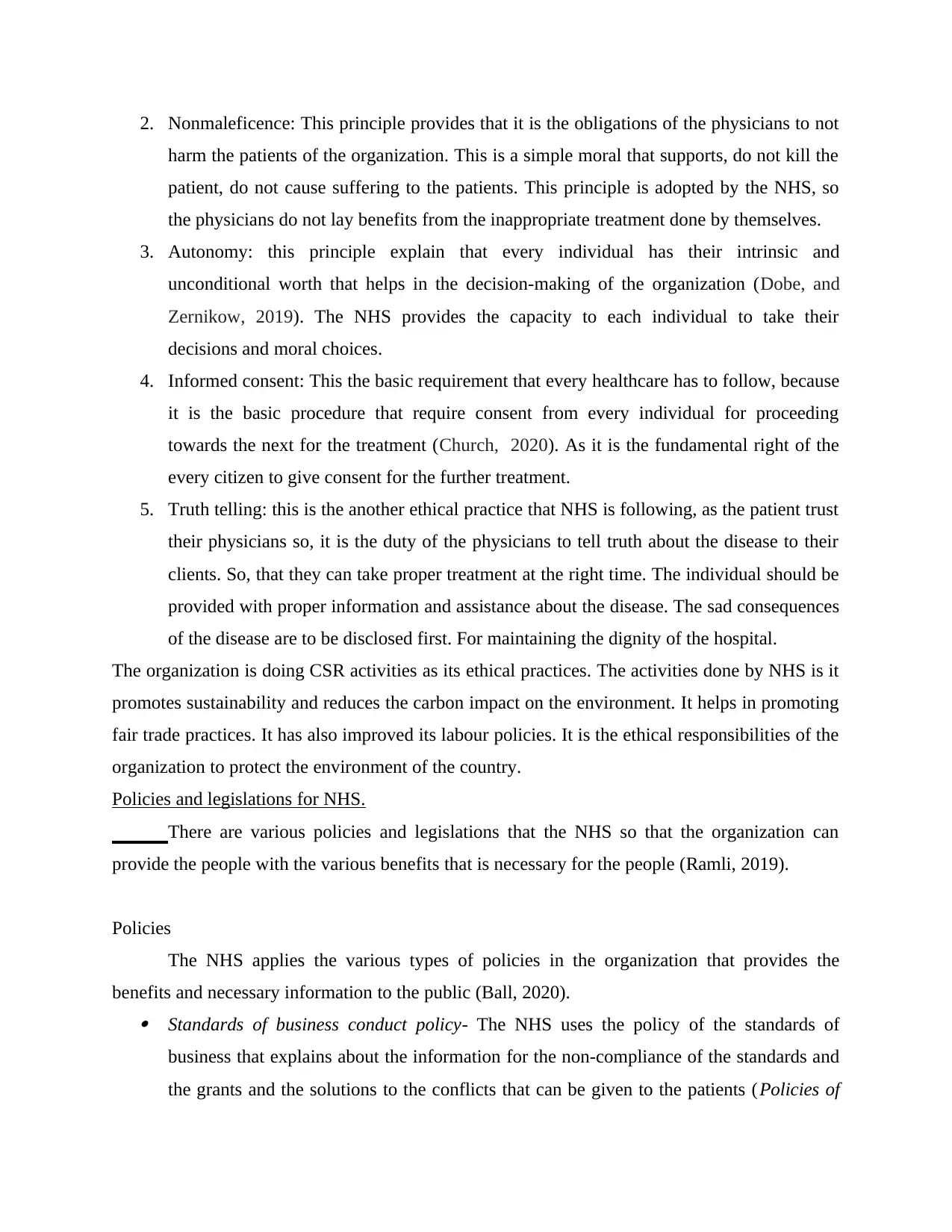
2. Nonmaleficence: This principle provides that it is the obligations of the physicians to not
harm the patients of the organization. This is a simple moral that supports, do not kill the
patient, do not cause suffering to the patients. This principle is adopted by the NHS, so
the physicians do not lay benefits from the inappropriate treatment done by themselves.
3. Autonomy: this principle explain that every individual has their intrinsic and
unconditional worth that helps in the decision-making of the organization (Dobe, and
Zernikow, 2019). The NHS provides the capacity to each individual to take their
decisions and moral choices.
4. Informed consent: This the basic requirement that every healthcare has to follow, because
it is the basic procedure that require consent from every individual for proceeding
towards the next for the treatment (Church, 2020). As it is the fundamental right of the
every citizen to give consent for the further treatment.
5. Truth telling: this is the another ethical practice that NHS is following, as the patient trust
their physicians so, it is the duty of the physicians to tell truth about the disease to their
clients. So, that they can take proper treatment at the right time. The individual should be
provided with proper information and assistance about the disease. The sad consequences
of the disease are to be disclosed first. For maintaining the dignity of the hospital.
The organization is doing CSR activities as its ethical practices. The activities done by NHS is it
promotes sustainability and reduces the carbon impact on the environment. It helps in promoting
fair trade practices. It has also improved its labour policies. It is the ethical responsibilities of the
organization to protect the environment of the country.
Policies and legislations for NHS.
There are various policies and legislations that the NHS so that the organization can
provide the people with the various benefits that is necessary for the people (Ramli, 2019).
Policies
The NHS applies the various types of policies in the organization that provides the
benefits and necessary information to the public (Ball, 2020). Standards of business conduct policy- The NHS uses the policy of the standards of
business that explains about the information for the non-compliance of the standards and
the grants and the solutions to the conflicts that can be given to the patients (Policies of
harm the patients of the organization. This is a simple moral that supports, do not kill the
patient, do not cause suffering to the patients. This principle is adopted by the NHS, so
the physicians do not lay benefits from the inappropriate treatment done by themselves.
3. Autonomy: this principle explain that every individual has their intrinsic and
unconditional worth that helps in the decision-making of the organization (Dobe, and
Zernikow, 2019). The NHS provides the capacity to each individual to take their
decisions and moral choices.
4. Informed consent: This the basic requirement that every healthcare has to follow, because
it is the basic procedure that require consent from every individual for proceeding
towards the next for the treatment (Church, 2020). As it is the fundamental right of the
every citizen to give consent for the further treatment.
5. Truth telling: this is the another ethical practice that NHS is following, as the patient trust
their physicians so, it is the duty of the physicians to tell truth about the disease to their
clients. So, that they can take proper treatment at the right time. The individual should be
provided with proper information and assistance about the disease. The sad consequences
of the disease are to be disclosed first. For maintaining the dignity of the hospital.
The organization is doing CSR activities as its ethical practices. The activities done by NHS is it
promotes sustainability and reduces the carbon impact on the environment. It helps in promoting
fair trade practices. It has also improved its labour policies. It is the ethical responsibilities of the
organization to protect the environment of the country.
Policies and legislations for NHS.
There are various policies and legislations that the NHS so that the organization can
provide the people with the various benefits that is necessary for the people (Ramli, 2019).
Policies
The NHS applies the various types of policies in the organization that provides the
benefits and necessary information to the public (Ball, 2020). Standards of business conduct policy- The NHS uses the policy of the standards of
business that explains about the information for the non-compliance of the standards and
the grants and the solutions to the conflicts that can be given to the patients (Policies of
⊘ This is a preview!⊘
Do you want full access?
Subscribe today to unlock all pages.

Trusted by 1+ million students worldwide
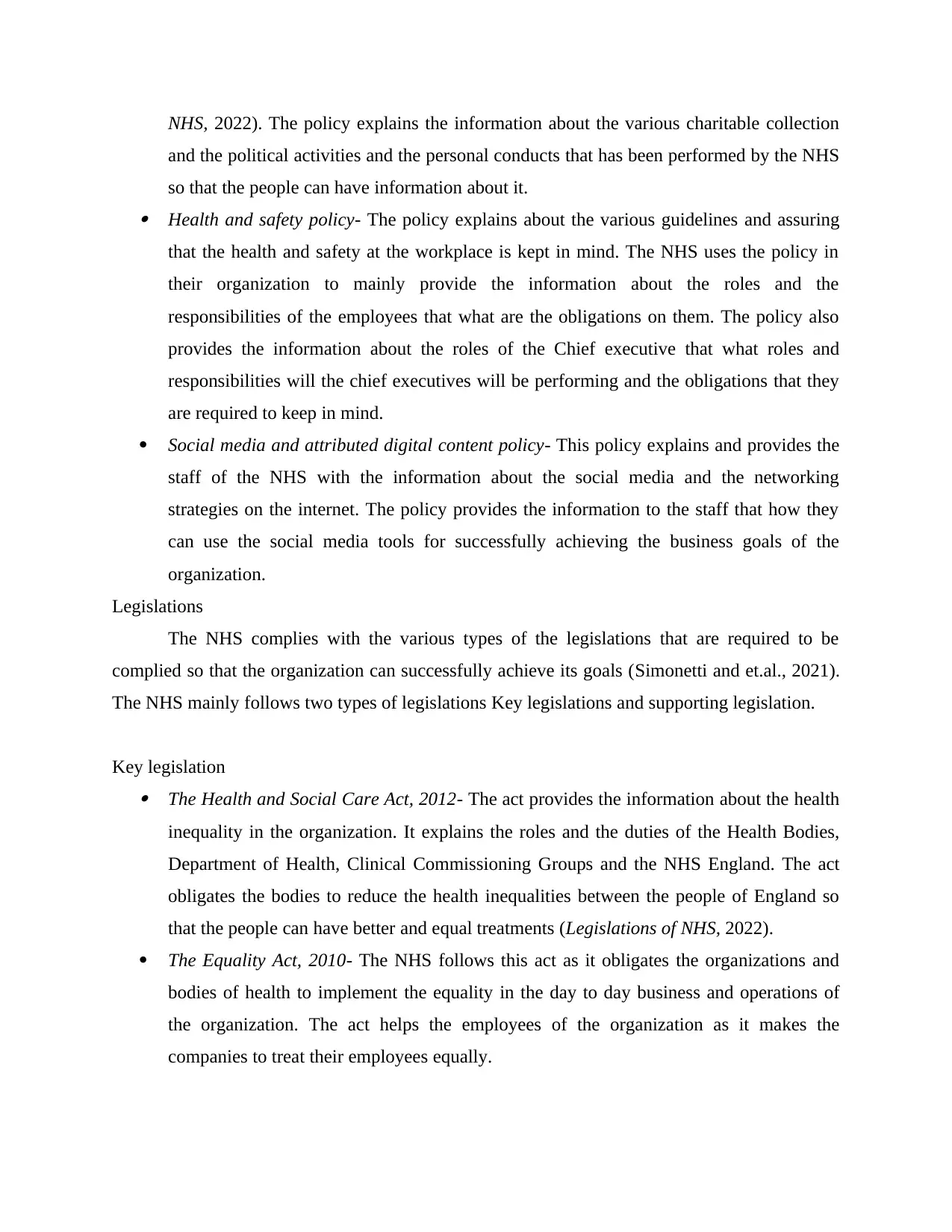
NHS, 2022). The policy explains the information about the various charitable collection
and the political activities and the personal conducts that has been performed by the NHS
so that the people can have information about it. Health and safety policy- The policy explains about the various guidelines and assuring
that the health and safety at the workplace is kept in mind. The NHS uses the policy in
their organization to mainly provide the information about the roles and the
responsibilities of the employees that what are the obligations on them. The policy also
provides the information about the roles of the Chief executive that what roles and
responsibilities will the chief executives will be performing and the obligations that they
are required to keep in mind.
Social media and attributed digital content policy- This policy explains and provides the
staff of the NHS with the information about the social media and the networking
strategies on the internet. The policy provides the information to the staff that how they
can use the social media tools for successfully achieving the business goals of the
organization.
Legislations
The NHS complies with the various types of the legislations that are required to be
complied so that the organization can successfully achieve its goals (Simonetti and et.al., 2021).
The NHS mainly follows two types of legislations Key legislations and supporting legislation.
Key legislation The Health and Social Care Act, 2012- The act provides the information about the health
inequality in the organization. It explains the roles and the duties of the Health Bodies,
Department of Health, Clinical Commissioning Groups and the NHS England. The act
obligates the bodies to reduce the health inequalities between the people of England so
that the people can have better and equal treatments (Legislations of NHS, 2022).
The Equality Act, 2010- The NHS follows this act as it obligates the organizations and
bodies of health to implement the equality in the day to day business and operations of
the organization. The act helps the employees of the organization as it makes the
companies to treat their employees equally.
and the political activities and the personal conducts that has been performed by the NHS
so that the people can have information about it. Health and safety policy- The policy explains about the various guidelines and assuring
that the health and safety at the workplace is kept in mind. The NHS uses the policy in
their organization to mainly provide the information about the roles and the
responsibilities of the employees that what are the obligations on them. The policy also
provides the information about the roles of the Chief executive that what roles and
responsibilities will the chief executives will be performing and the obligations that they
are required to keep in mind.
Social media and attributed digital content policy- This policy explains and provides the
staff of the NHS with the information about the social media and the networking
strategies on the internet. The policy provides the information to the staff that how they
can use the social media tools for successfully achieving the business goals of the
organization.
Legislations
The NHS complies with the various types of the legislations that are required to be
complied so that the organization can successfully achieve its goals (Simonetti and et.al., 2021).
The NHS mainly follows two types of legislations Key legislations and supporting legislation.
Key legislation The Health and Social Care Act, 2012- The act provides the information about the health
inequality in the organization. It explains the roles and the duties of the Health Bodies,
Department of Health, Clinical Commissioning Groups and the NHS England. The act
obligates the bodies to reduce the health inequalities between the people of England so
that the people can have better and equal treatments (Legislations of NHS, 2022).
The Equality Act, 2010- The NHS follows this act as it obligates the organizations and
bodies of health to implement the equality in the day to day business and operations of
the organization. The act helps the employees of the organization as it makes the
companies to treat their employees equally.
Paraphrase This Document
Need a fresh take? Get an instant paraphrase of this document with our AI Paraphraser
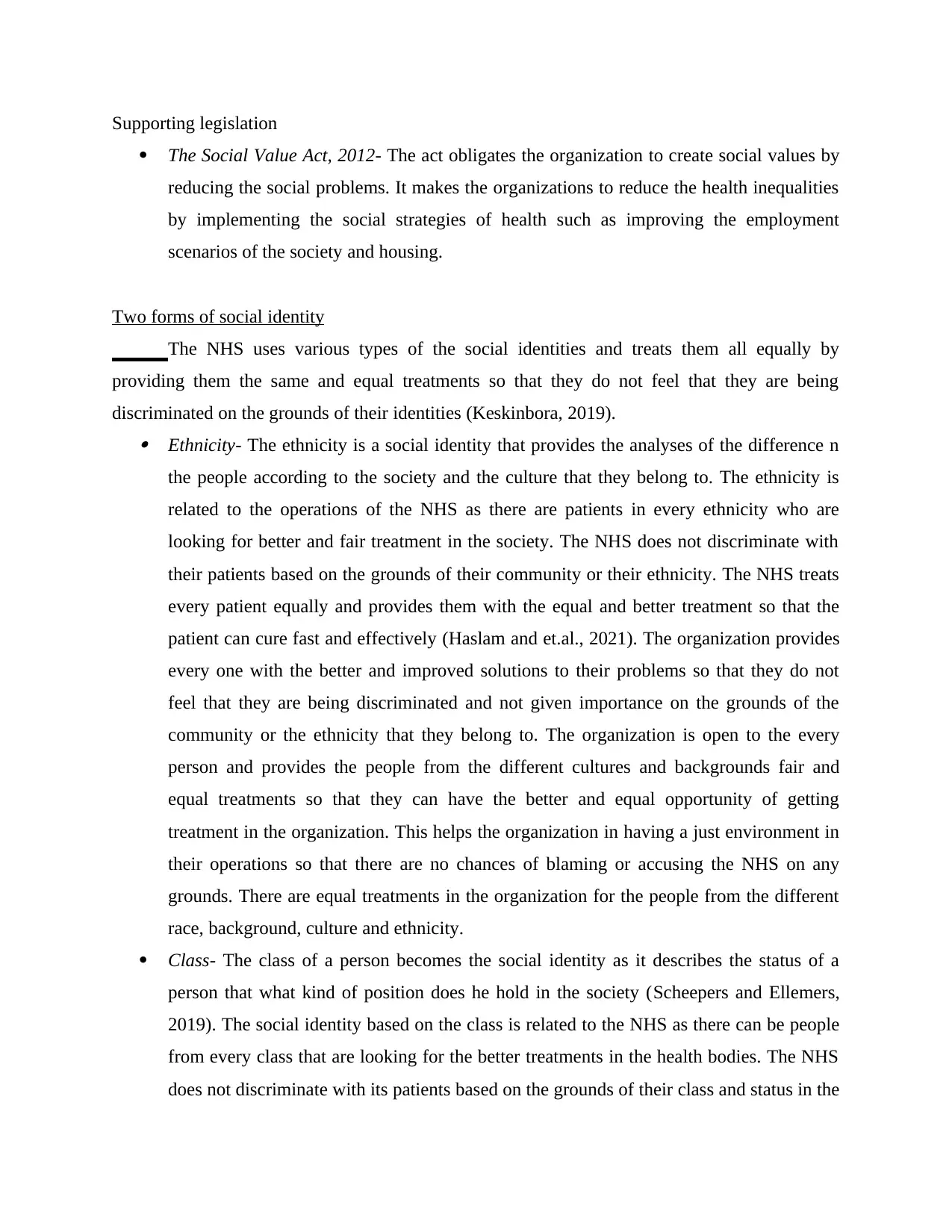
Supporting legislation
The Social Value Act, 2012- The act obligates the organization to create social values by
reducing the social problems. It makes the organizations to reduce the health inequalities
by implementing the social strategies of health such as improving the employment
scenarios of the society and housing.
Two forms of social identity
The NHS uses various types of the social identities and treats them all equally by
providing them the same and equal treatments so that they do not feel that they are being
discriminated on the grounds of their identities (Keskinbora, 2019). Ethnicity- The ethnicity is a social identity that provides the analyses of the difference n
the people according to the society and the culture that they belong to. The ethnicity is
related to the operations of the NHS as there are patients in every ethnicity who are
looking for better and fair treatment in the society. The NHS does not discriminate with
their patients based on the grounds of their community or their ethnicity. The NHS treats
every patient equally and provides them with the equal and better treatment so that the
patient can cure fast and effectively (Haslam and et.al., 2021). The organization provides
every one with the better and improved solutions to their problems so that they do not
feel that they are being discriminated and not given importance on the grounds of the
community or the ethnicity that they belong to. The organization is open to the every
person and provides the people from the different cultures and backgrounds fair and
equal treatments so that they can have the better and equal opportunity of getting
treatment in the organization. This helps the organization in having a just environment in
their operations so that there are no chances of blaming or accusing the NHS on any
grounds. There are equal treatments in the organization for the people from the different
race, background, culture and ethnicity.
Class- The class of a person becomes the social identity as it describes the status of a
person that what kind of position does he hold in the society (Scheepers and Ellemers,
2019). The social identity based on the class is related to the NHS as there can be people
from every class that are looking for the better treatments in the health bodies. The NHS
does not discriminate with its patients based on the grounds of their class and status in the
The Social Value Act, 2012- The act obligates the organization to create social values by
reducing the social problems. It makes the organizations to reduce the health inequalities
by implementing the social strategies of health such as improving the employment
scenarios of the society and housing.
Two forms of social identity
The NHS uses various types of the social identities and treats them all equally by
providing them the same and equal treatments so that they do not feel that they are being
discriminated on the grounds of their identities (Keskinbora, 2019). Ethnicity- The ethnicity is a social identity that provides the analyses of the difference n
the people according to the society and the culture that they belong to. The ethnicity is
related to the operations of the NHS as there are patients in every ethnicity who are
looking for better and fair treatment in the society. The NHS does not discriminate with
their patients based on the grounds of their community or their ethnicity. The NHS treats
every patient equally and provides them with the equal and better treatment so that the
patient can cure fast and effectively (Haslam and et.al., 2021). The organization provides
every one with the better and improved solutions to their problems so that they do not
feel that they are being discriminated and not given importance on the grounds of the
community or the ethnicity that they belong to. The organization is open to the every
person and provides the people from the different cultures and backgrounds fair and
equal treatments so that they can have the better and equal opportunity of getting
treatment in the organization. This helps the organization in having a just environment in
their operations so that there are no chances of blaming or accusing the NHS on any
grounds. There are equal treatments in the organization for the people from the different
race, background, culture and ethnicity.
Class- The class of a person becomes the social identity as it describes the status of a
person that what kind of position does he hold in the society (Scheepers and Ellemers,
2019). The social identity based on the class is related to the NHS as there can be people
from every class that are looking for the better treatments in the health bodies. The NHS
does not discriminate with its patients based on the grounds of their class and status in the
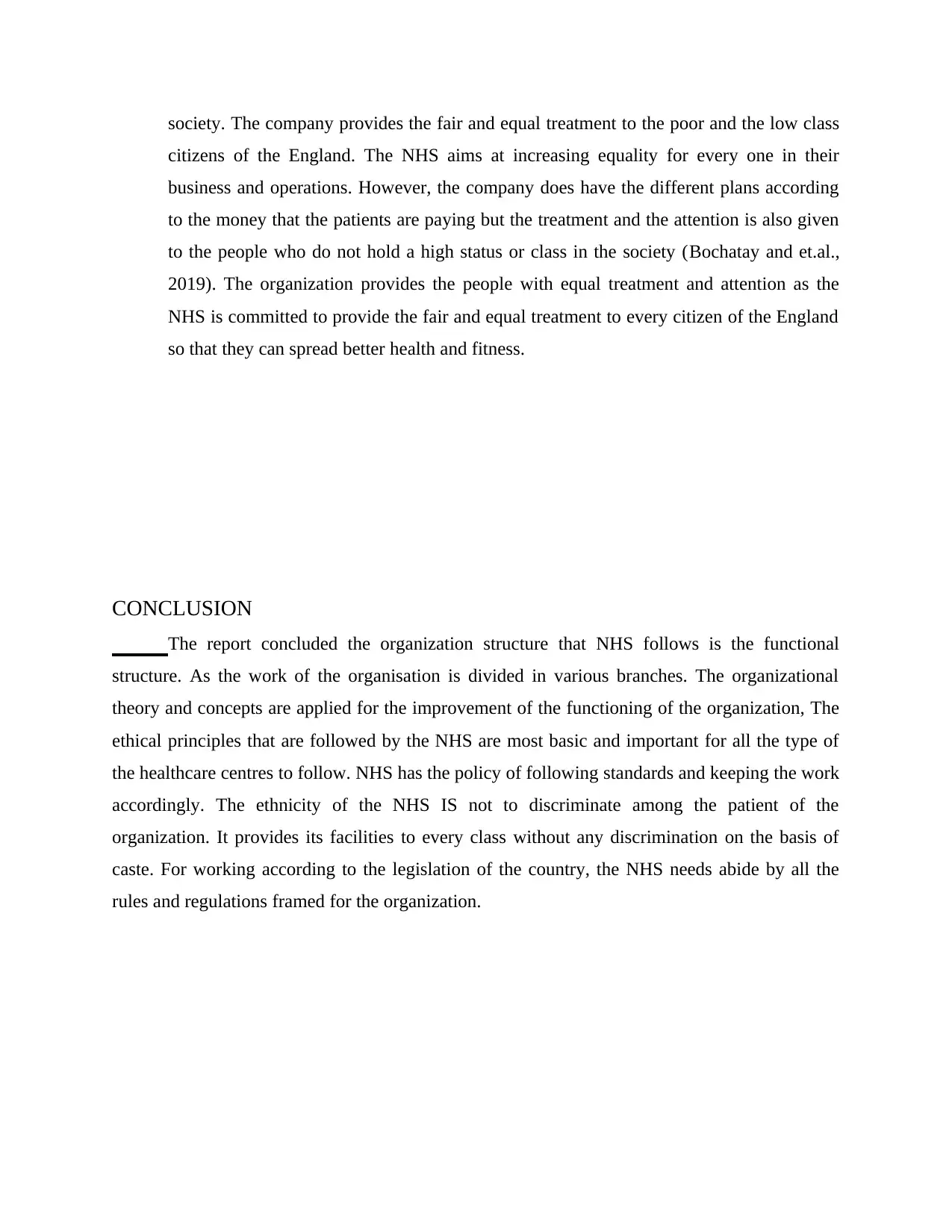
society. The company provides the fair and equal treatment to the poor and the low class
citizens of the England. The NHS aims at increasing equality for every one in their
business and operations. However, the company does have the different plans according
to the money that the patients are paying but the treatment and the attention is also given
to the people who do not hold a high status or class in the society (Bochatay and et.al.,
2019). The organization provides the people with equal treatment and attention as the
NHS is committed to provide the fair and equal treatment to every citizen of the England
so that they can spread better health and fitness.
CONCLUSION
The report concluded the organization structure that NHS follows is the functional
structure. As the work of the organisation is divided in various branches. The organizational
theory and concepts are applied for the improvement of the functioning of the organization, The
ethical principles that are followed by the NHS are most basic and important for all the type of
the healthcare centres to follow. NHS has the policy of following standards and keeping the work
accordingly. The ethnicity of the NHS IS not to discriminate among the patient of the
organization. It provides its facilities to every class without any discrimination on the basis of
caste. For working according to the legislation of the country, the NHS needs abide by all the
rules and regulations framed for the organization.
citizens of the England. The NHS aims at increasing equality for every one in their
business and operations. However, the company does have the different plans according
to the money that the patients are paying but the treatment and the attention is also given
to the people who do not hold a high status or class in the society (Bochatay and et.al.,
2019). The organization provides the people with equal treatment and attention as the
NHS is committed to provide the fair and equal treatment to every citizen of the England
so that they can spread better health and fitness.
CONCLUSION
The report concluded the organization structure that NHS follows is the functional
structure. As the work of the organisation is divided in various branches. The organizational
theory and concepts are applied for the improvement of the functioning of the organization, The
ethical principles that are followed by the NHS are most basic and important for all the type of
the healthcare centres to follow. NHS has the policy of following standards and keeping the work
accordingly. The ethnicity of the NHS IS not to discriminate among the patient of the
organization. It provides its facilities to every class without any discrimination on the basis of
caste. For working according to the legislation of the country, the NHS needs abide by all the
rules and regulations framed for the organization.
⊘ This is a preview!⊘
Do you want full access?
Subscribe today to unlock all pages.

Trusted by 1+ million students worldwide
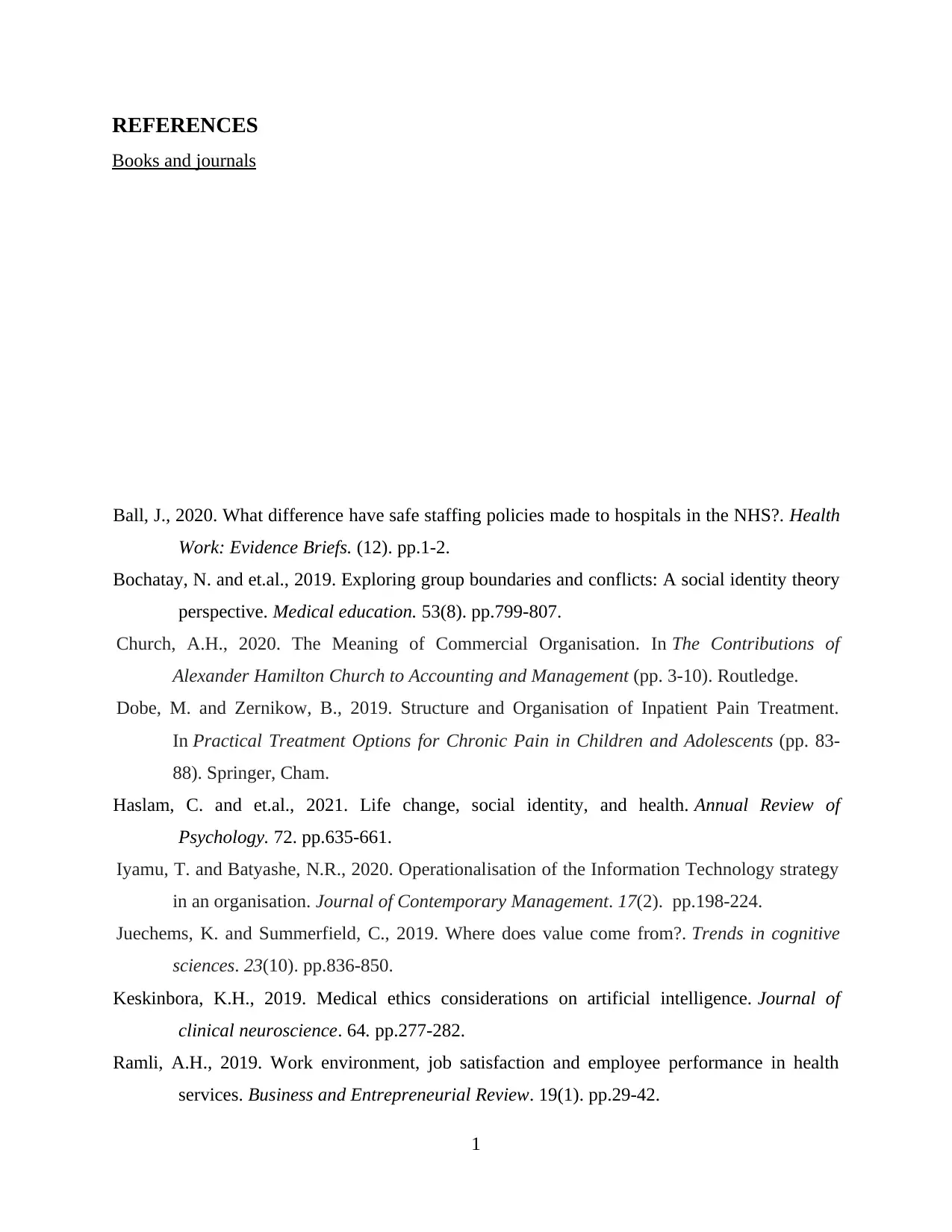
REFERENCES
Books and journals
Ball, J., 2020. What difference have safe staffing policies made to hospitals in the NHS?. Health
Work: Evidence Briefs. (12). pp.1-2.
Bochatay, N. and et.al., 2019. Exploring group boundaries and conflicts: A social identity theory
perspective. Medical education. 53(8). pp.799-807.
Church, A.H., 2020. The Meaning of Commercial Organisation. In The Contributions of
Alexander Hamilton Church to Accounting and Management (pp. 3-10). Routledge.
Dobe, M. and Zernikow, B., 2019. Structure and Organisation of Inpatient Pain Treatment.
In Practical Treatment Options for Chronic Pain in Children and Adolescents (pp. 83-
88). Springer, Cham.
Haslam, C. and et.al., 2021. Life change, social identity, and health. Annual Review of
Psychology. 72. pp.635-661.
Iyamu, T. and Batyashe, N.R., 2020. Operationalisation of the Information Technology strategy
in an organisation. Journal of Contemporary Management. 17(2). pp.198-224.
Juechems, K. and Summerfield, C., 2019. Where does value come from?. Trends in cognitive
sciences. 23(10). pp.836-850.
Keskinbora, K.H., 2019. Medical ethics considerations on artificial intelligence. Journal of
clinical neuroscience. 64. pp.277-282.
Ramli, A.H., 2019. Work environment, job satisfaction and employee performance in health
services. Business and Entrepreneurial Review. 19(1). pp.29-42.
1
Books and journals
Ball, J., 2020. What difference have safe staffing policies made to hospitals in the NHS?. Health
Work: Evidence Briefs. (12). pp.1-2.
Bochatay, N. and et.al., 2019. Exploring group boundaries and conflicts: A social identity theory
perspective. Medical education. 53(8). pp.799-807.
Church, A.H., 2020. The Meaning of Commercial Organisation. In The Contributions of
Alexander Hamilton Church to Accounting and Management (pp. 3-10). Routledge.
Dobe, M. and Zernikow, B., 2019. Structure and Organisation of Inpatient Pain Treatment.
In Practical Treatment Options for Chronic Pain in Children and Adolescents (pp. 83-
88). Springer, Cham.
Haslam, C. and et.al., 2021. Life change, social identity, and health. Annual Review of
Psychology. 72. pp.635-661.
Iyamu, T. and Batyashe, N.R., 2020. Operationalisation of the Information Technology strategy
in an organisation. Journal of Contemporary Management. 17(2). pp.198-224.
Juechems, K. and Summerfield, C., 2019. Where does value come from?. Trends in cognitive
sciences. 23(10). pp.836-850.
Keskinbora, K.H., 2019. Medical ethics considerations on artificial intelligence. Journal of
clinical neuroscience. 64. pp.277-282.
Ramli, A.H., 2019. Work environment, job satisfaction and employee performance in health
services. Business and Entrepreneurial Review. 19(1). pp.29-42.
1
Paraphrase This Document
Need a fresh take? Get an instant paraphrase of this document with our AI Paraphraser
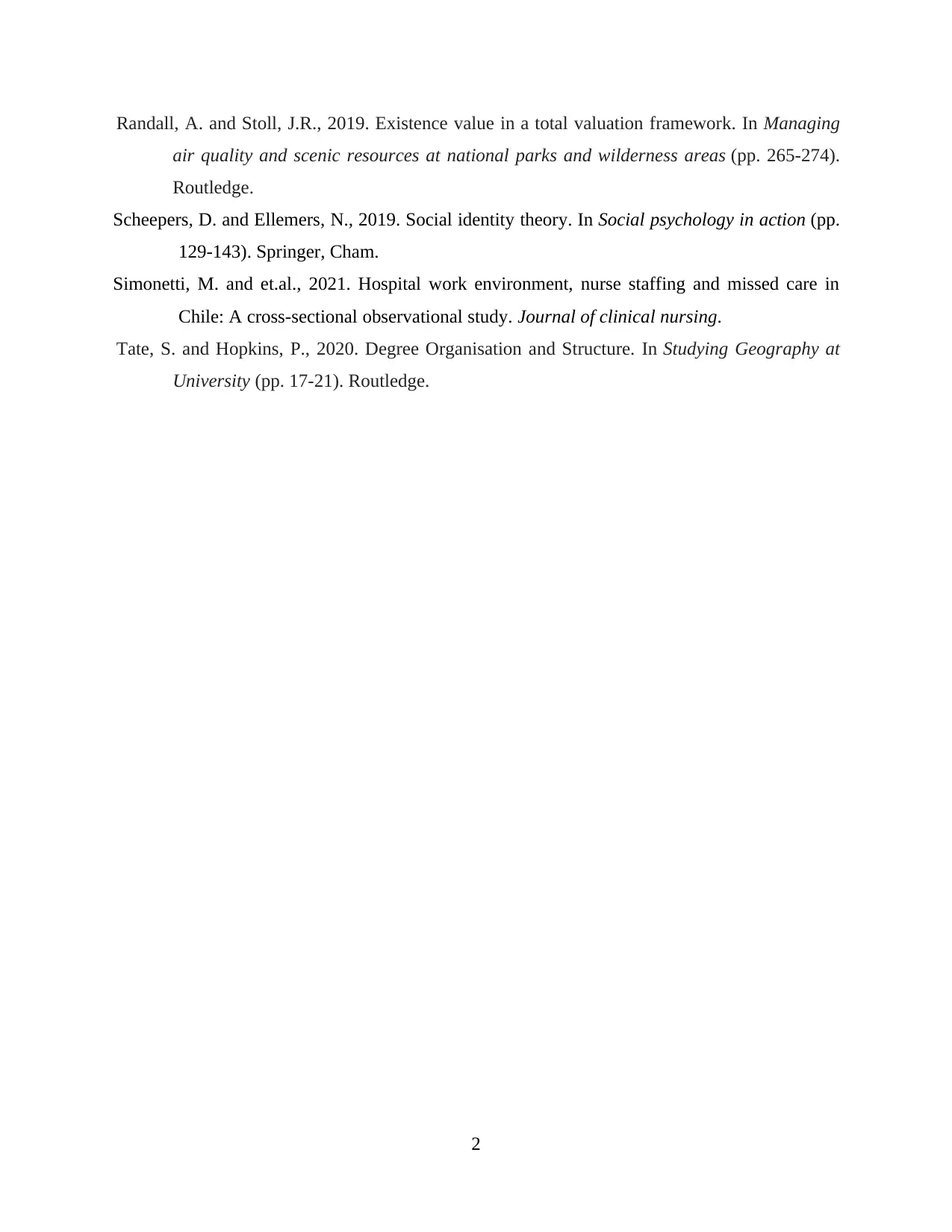
Randall, A. and Stoll, J.R., 2019. Existence value in a total valuation framework. In Managing
air quality and scenic resources at national parks and wilderness areas (pp. 265-274).
Routledge.
Scheepers, D. and Ellemers, N., 2019. Social identity theory. In Social psychology in action (pp.
129-143). Springer, Cham.
Simonetti, M. and et.al., 2021. Hospital work environment, nurse staffing and missed care in
Chile: A cross‐sectional observational study. Journal of clinical nursing.
Tate, S. and Hopkins, P., 2020. Degree Organisation and Structure. In Studying Geography at
University (pp. 17-21). Routledge.
2
air quality and scenic resources at national parks and wilderness areas (pp. 265-274).
Routledge.
Scheepers, D. and Ellemers, N., 2019. Social identity theory. In Social psychology in action (pp.
129-143). Springer, Cham.
Simonetti, M. and et.al., 2021. Hospital work environment, nurse staffing and missed care in
Chile: A cross‐sectional observational study. Journal of clinical nursing.
Tate, S. and Hopkins, P., 2020. Degree Organisation and Structure. In Studying Geography at
University (pp. 17-21). Routledge.
2
1 out of 11
Related Documents
Your All-in-One AI-Powered Toolkit for Academic Success.
+13062052269
info@desklib.com
Available 24*7 on WhatsApp / Email
![[object Object]](/_next/static/media/star-bottom.7253800d.svg)
Unlock your academic potential
Copyright © 2020–2025 A2Z Services. All Rights Reserved. Developed and managed by ZUCOL.





